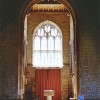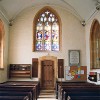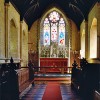In the summer of 1840 Mr T.P. Russell decided to spend a month at the seaside resort of Weymouth. He brought with him from Gloucester, where he was a banker, his wife, two daughters, brother-in-law and a maid. Mr Russell was 65 and suffered from rheumatism; his wife was 56 and his two daughters were in their early thirties. He kept a diary of their month-long holiday at the seaside resort made popular by George III.
They departed from Gloucester in their own carriage. Along the way a small repair to the carriage was necessary and they spent a night at Bath, after sending their maid on separately with luggage. In the morning the family was on the road again, stopping at Frome to change horses, then onto Bruton and Sherborne, passing through many cloth manufacturing villages on the way. Mr Russell thought Sherborne “large but ill-built.” By 5 o’clock the family group had arrived at Luce’s Hotel in Augusta Place, Weymouth, having passed through Dorchester, which Mr Russell decided was “better constructed” than Sherborne.
The family had dinner at the Hotel at a cost of one guinea, including tip. Then followed a stroll along the Esplanade to the Alexandra Gardens where they listened to a band of fourteen Fusiliers.
Lodgings for their stay were found at 6 York Buildings; “clean and sufficient Commodious but dear at fifty shillings a week” thought Mr Russell. The family spent the morning buying supplies with help from Mr Thomas, who kept a library on the Esplanade. He had been recommended to Mr Russell and “proved most helpful”. Mr Russell commented “We found the town larger than we expected, with very good shops and a good market, fish plentiful and at a low price. The baths, however, were a disappointment, being poor.”
The next day Mr Russell took his first warm sea bath. The rest of the family walked along the beach and watched the yachts in the bay. The weather was showery and blustery but this did not deter the family taking a trip in a rowing boat followed by a walk to Radipole Spa where they could smell the Sulphur Spring. The family made an expedition to Wyke, “a pretty rural village with a handsome church”. It was mid-August and corn was being cut.
The family expressed satisfaction with their lodgings and the “cheerful” situation but there was some disappointment as Mr Russell commented: “the place does not fill as much as we expected, the fashion of it has partly gone”.
Mr Russell was suffering from rheumatic pain and did not accompany the family to church on Sunday. The weather was stormy and Mr Russell chose instead to write letters and visit Mr Thomas’ library. The next day the family could have gone to the local races but decided to sail out to Portland, where they saw a large ship bound for Sydney and a brig en route for America.
A few days later they again set off for Portland and found that no work was being done in the quarries as the men were on strike for higher wages. Mr Russell thought the sheep on Portland were “poor”. He was very interested in the modern castle, probably Pennsylvannia, but he found the island generally desolate: “a few miserable villages, scattered on sterile land”, was how he summed up Portland.
Mr Russell continued to take warm sea baths but they did nothing to improve the rheumatic pain. One of his daughters swam in the sea and the family visited Osmington about which Mr Russell said: “a very beautiful retired village very neat, rural and clean, with roses in full bloom”. The church (which one of his daughters sketched) was “remarkably clean and neat”. The family saw the hillside chalk image of King George on his horse. On another trip to Osmington Mills, prawns and lobsters were sampled. At dinner one evening they tried a fish called “pipers, ugly with a large head”; it was eaten baked and stuffed.
The maid joined them on their next boat trip and they all watched men unloading stone for an extension to the pier. Other days passed with them taking walks but because of his rheumatism Mr Russell had to travel by bath chair, which cost him one shilling and sixpence a time; his baths cost three shillings.
The family returned home to Gloucester on the 8th of September by way of Sherborne, Castle Cary and Clifton. On the whole they had enjoyed their stay by the sea and left with some regret.
Mr Russell’s diary concludes with a breakdown of costs; after all he was a banker. The journey to Weymouth cost fourteen pounds, eight shillings and ten pence, the return journey seventeen pounds, one shilling and sixpence. The subscription to the rooms for the month was ten shillings; the boatmen charged four shillings a trip. Four weeks lodgings with linen came to twenty-two pounds and a piano was hired at a cost of thirteen shillings and nine shillings was spent on wine. The total cost for the month was almost eighty three pounds and the diary makes clear this includes the maid, although how much of a holiday the trip was for her, we can only speculate about.



